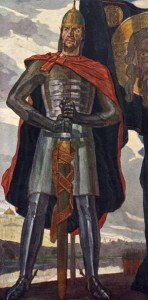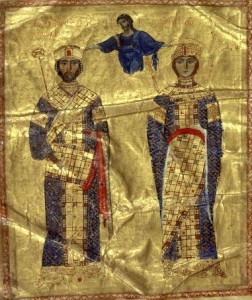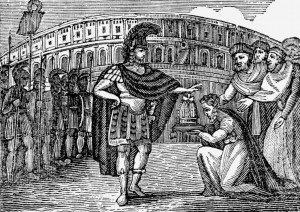 Listener Steve asked what (excluding Procopius) are the sources- Byzantine or otherwise- for the life and career of Belisarius?
Listener Steve asked what (excluding Procopius) are the sources- Byzantine or otherwise- for the life and career of Belisarius?
The good news is that there were a lot of historians and chroniclers active during Belisarius’ lifetime, and most of them were aware that they were living through significant times. Procopius stopped writing in 552 and was continued by Agathias Scholasticus till the year 588. He was in turn followed by a man named Menander Protector who decided to write history after he had blown his life savings having a good time. This was evidently a smart career choice as Menander was soon joined by a crowd of writers. If you fancied Justinian’s reign you could pick up bestsellers from Evagrius, John of Epiphaneia, John Malalas, and Marcellinus Comes.
The bad news, however, is that most of these are only partially translated today- or worse exist only in fragments. Unless you know someone at Dumbarton Oaks, you’re probably not going to be able to read them anytime soon. The only commercially available, non-Procopius source is Jordanes. He was a 6th century Roman bureaucrat who had a book collection and the rare gift (as he put it) of being concise. A friend who wanted to read a history of the Goths asked to borrow a copy of Cassiodorus’ (now lost) work, but when he saw its size (12 volumes) he asked Jordanes to sum it up for him. The result is the Getica, which concludes with Belisarius’ brilliant defeat of the Goths in 540.
 Reader Evan asked who was the last person from the original Roman patrician families to play a significant role in Byzantine history.
Reader Evan asked who was the last person from the original Roman patrician families to play a significant role in Byzantine history.
The last mention I can find is the Emperor Nicephorus III (1078-1081) who claimed to be descended from the ancient Fabii. This may have been wishful thinking on his part, but it does hint at the intriguing possibility that genealogical records survived the Byzantine ‘dark’ ages. The main problem with finding a descendant of the early families is that so many records were destroyed in the chaos of the 7th – 9th centuries, and many traditions were not maintained. And of course many patrician families had fallen on hard times even by Julius Caesar’s day (the Julii for example were impoverished) and the rank of Patrician became a mere political plaything during the empire. By the time of Augustus’ death (14 AD) only 15 families were left, and a century later that number had dropped to just 6. Constantine supplied new blood by opening the rolls to anyone in the imperial court (he was trying to lure as many patricians as possible to Constantinople to increase its prestige, and when that failed he just created new ones). Justinian further diluted it by making everyone of Senatorial rank a patrician. This was an easy (inexpensive) way of rewarding followers and it started an imperial trend of granting the rank in greater and greater numbers. By the 11th century it had been so extensively handed out that it meant little, and by the 12th century it disappeared completely.
 Listener Gary asks which of the few books on Belisarius are the best. My favorite is the classic one by Lord Mahon (Philip Henry Stanhope) called ‘The Life of Belisarius’. Originally published in 1829, it’s a bit outdated (it continues the myth of Belisarius’ blinding), but remains the standard if only for want of a serious rival. If you prefer a more modern perspective there is Ian Hughes’ 2009 ‘Belisarius: The Last Roman General’, and if you don’t mind a touch of historical fiction, there is Robert Graves’ (author of ‘I Claudius’) very entertaining- and generally historically accurate- version called ‘Count Belisarius’.
Listener Gary asks which of the few books on Belisarius are the best. My favorite is the classic one by Lord Mahon (Philip Henry Stanhope) called ‘The Life of Belisarius’. Originally published in 1829, it’s a bit outdated (it continues the myth of Belisarius’ blinding), but remains the standard if only for want of a serious rival. If you prefer a more modern perspective there is Ian Hughes’ 2009 ‘Belisarius: The Last Roman General’, and if you don’t mind a touch of historical fiction, there is Robert Graves’ (author of ‘I Claudius’) very entertaining- and generally historically accurate- version called ‘Count Belisarius’.
 Listener Steve asked what (excluding Procopius) are the sources- Byzantine or otherwise- for the life and career of Belisarius?
Listener Steve asked what (excluding Procopius) are the sources- Byzantine or otherwise- for the life and career of Belisarius?
